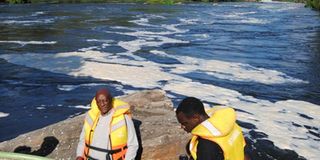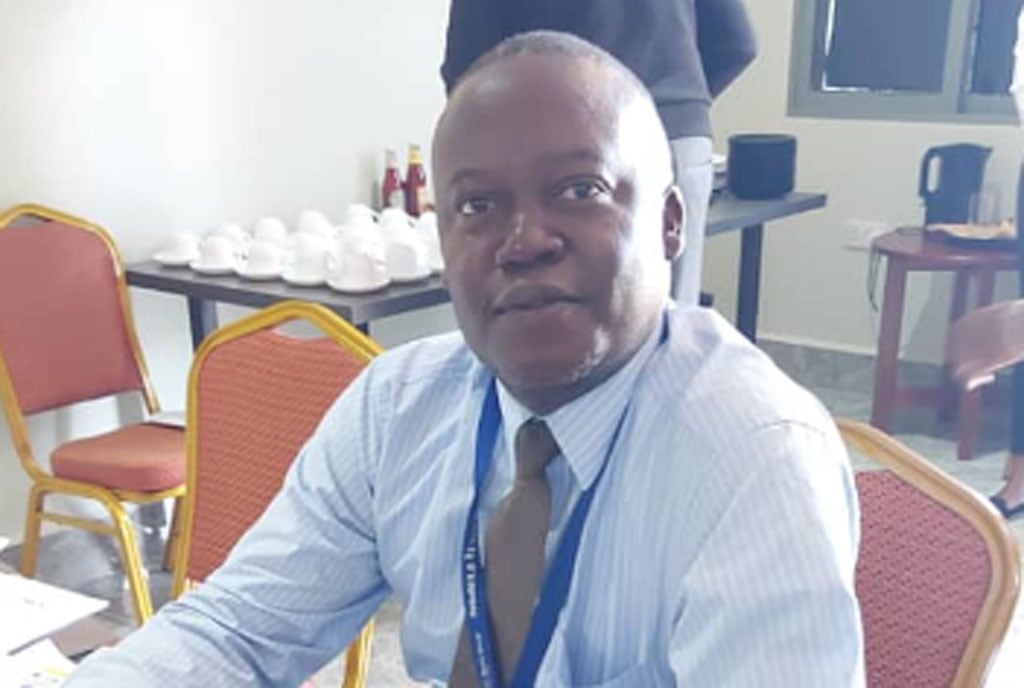Conservationists in a bid to save River Nile

Omukama of Bunyoro Solomon Gafabusa Iguru (left) at the bottom of Murchison Falls on River Nile. The river runs through 10 countries. FILE PHOTO
What you need to know:
Mr Ernest Nabihamba, the Jinja City Natural Resources Officer, said bathing in River Nile has become hazardous due to Bilharzia-carrying snails, adding that the Nile is currently being plagued by wetland degradation, pollution (industrial waste discharges), settlements and agricultural activities
The first-ever conference to offer short and long-term mitigation to the state of River Nile, which has seen part of its banks being degraded and its water polluted, has been scheduled.
Mr Ernest Nabihamba, the Jinja City Natural Resources Officer, said bathing in River Nile has become hazardous due to Bilharzia-carrying snails, adding that the Nile is currently being plagued by wetland degradation, pollution (industrial waste discharges), settlements and agricultural activities.
“About 10 years ago, President Museveni gave people doing agriculture around the Nile six months to vacate. While some left, others are still there saying they have land there and that they have stayed there for more than 40 years,” he said in an interview on Monday.
“We have engaged the district police commanders (DPCs) and regional police commanders (RPCs) but have not succeeded because the settlers continue to carry out agricultural activities,” Mr Nabihamba added.
According to Mr Nabihamba, most factories in Jinja City discharge effluents into River Nile, “almost everybody” is dumping garbage into the river. The land around River Nile has been sold to people to settle yet there are no sewage treatment facilities. The biggest challenges to River Nile are the manufacturers who discharge effluents, farmers who use pesticides, settlers who have no sewage treatment facilities, and managers of the town who are not enforcing the law.
He also noted that people are getting land titles in such a protected zone.
“If you have some development to put in place, you are supposed to get a user permit from the National Environment Management Authority (Nema), not a title. But people have titles on wetlands, river banks and lakeshores,” he added.
As a result, Mr Toshi Bwana, a founding member of Umoja Conservation Trust, a civil society organisation, said the Nile Conservation Week is for the first time going to be on their annual calendar.
“The entire livelihood of people in Jinja City, Kamuli and probably the greater part of Busoga is from the Nile, but we have not even exploited it to our best,” Mr Bwana said in an interview.
He added: “The Nile eco-system has the capacity to earn Uganda a minimum of $25 billion (about Shs92 trillion) through sustainable utilisation such as the Nile Green Economy, which includes the tourism aspect that is very critical but hasn’t been well-utilised.”
“We want to rally every Ugandan in Jinja along the Nile to join us on April 5 as we have the first Nile Conservation Conference and on April 6 as we have the first Nile Cultural festival, which will bring together 11 cultures (countries), some of which 96 percent entirely depend on the Nile.”
Mr Bwana noted that when it comes to pollution, that this is not the colour that the Nile had a couple of years ago. He added that this particular cultural festival is largely to protect and conserve the water source with the main objective of establishing community nurseries along the buffers, which will help create the 60 million high value trees needed to protect the Nile. These trees, he said, are not ordinary but of high value that can create a green economy, including Macadamia, Hass avocado, Bamboo, Jack fruit, and mangoes among others.
By creating the Nile green economy, Mr Bwana said, Uganda will be able to sustainably utilise its natural resources, create employment and grow revenue without tempering with its God-given gift, the Nile.
Mr Darius Nandinda, the Jinja Resident City Commissioner, said President Museveni has made several directives as far as wetlands and swamps are concerned but he is being let down by the very people he entrusted.
“The challenge is that we have people called physical planners, surveyors, town clerks, chief administrative officers and environmental officers, but things are not good,” he said.
Way forward
However, Ms Victoria Sekitoleko, a director at Umoja Conservation Trust, said nobody in Uganda is untouchable.
“If anybody comes to Jinja and says they are from State House, tell them they took the wrong turn and this is Jinja. Instead, arrest and put them in jail. Most do more bragging but there is nothing they can do,” Ms Sekitoleko said.





